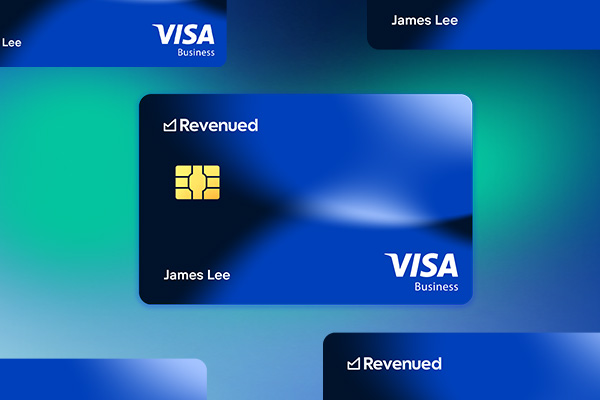The Ultimate Guide To Business Credit
Whether you’re looking to understand your business credit score or looking to grow your business credit, our easy-to-understand articles and guides will set you on the path to building the best business credit score possible. With good business credit, you’ll have a solid foundation for financial business health.
Business Credit
Updated 2024
10 min read
- Introduction to Business Credit
- Establishing and Building Business Credit
- Business Credit Scores and Reports
- Monitoring and Improving Business Credit
- Dealing with Bad Business Credit
- Leveraging Business Credit for Growth
- Business Credit Resources and Tools
- Applying for a Revenued Business Card
- Frequently Asked Questions
Introduction to Business Credit

What is Business Credit?
Business credit is a financial rating that measures the creditworthiness of a business. This rating is based on a business's complete credit history, including its payment history, outstanding debts, and other financial information. Business credit is an important tool for businesses, as it gives them better access to financing, helps them establish relationships with suppliers, and allows them to manage cash flow more effectively.
Business credit is different from personal credit in that it is tied to the business rather than the individual. This means that the creditworthiness of a business is separate from that of its owners or managers. Building good business credit for small business requires a deliberate effort to establish and maintain a positive credit history, which can take time and effort.
There are several different credit reporting agencies that track business credit, including Dun & Bradstreet, Experian, and Equifax. These agencies use different metrics to calculate business credit scores, but generally, a higher score indicates a more creditworthy business.
Why is Business Credit Important?
Business credit is important for several reasons. First, it gives businesses a better chance of receiving financing from lenders and investors. A strong business credit score can help businesses secure better interest rates and loan terms, which can save them money over time.
Tip
Having good business credit can help businesses establish relationships with suppliers and vendors, leading to better payment terms and discounts.
Another reason why business credit is important is that it can help businesses manage their cash flow more effectively. With good business credit, businesses can access funding when they need it, which can help them bridge gaps in cash flow and avoid disruptions in their operations.
Finally, business credit can help businesses build their credibility and establish a positive reputation. A strong credit score can signal to potential customers, investors, and partners that a business is financially stable and responsible, which can help attract new opportunities and partnerships.
Business Credit vs. Personal Credit
Business credit is different from personal credit in several ways. First, business credit is tied to the business itself, rather than the individual who manages or owns that business. This can be beneficial for businesses, as it allows them to establish their own credit history and build a reputation that is independent of their personal financial history.
Another key difference between business credit and personal credit is the way that the credit scores are calculated. A personal credit score (also known as a FICO score) is based on an individual's credit history and is tied to a Social Security number. This score is determined by factors like outstanding debts, timeliness of bill payments, credit mixes, and the length of the individual's credit history. A business credit score, on the other hand, is based on the credit history of the business itself and is tied to the business's Employer Identification Number (EIN). To determine a business credit score, major business credit bureaus will also look at payment history, but will include other factors like the age and size of the business, as well as the industry it is a part of.
Finally, the types of credit available to businesses and individuals can be different. Businesses may have access to lines of credit, trade credit, and other forms of financing that are not available to individual people. Additionally, the terms and conditions of business credit can look different from those of personal credit, with different interest rates, repayment terms, and other factors to consider.
Establishing and Building Business Credit
.jpg)
How to Establish Business Credit
- The first step to establishing business credit is to obtain an Employer Identification Number (EIN) from the IRS. This number serves as the business's tax ID and is necessary for opening bank accounts and applying for credit.
- Next, the business should open a bank account in its own legal business name and obtain a business credit card. This account should be used for all business-related expenses and should be paid off in full and on time to establish a positive credit history.
- The business should also establish relationships with suppliers and vendors that offer trade credit. Trade credit allows businesses to purchase goods and services on credit and pay for them at a later date. This type of credit can be an effective way to build business credit, but it's important to pay invoices on time to avoid damaging the business's score.
- Finally, the business should consider applying for a small business loan or line of credit. These types of financing can help establish a positive credit history, which gives an opportunity to establish a good credit history and, at the same time, provides the business with the capital it needs to grow.
Types of Business Credit
There are several types of business credit available, including trade credit, business credit cards, lines of credit, and term loans. Trade credit allows businesses to purchase goods and services on credit and pay for them at a later date. A business credit card work similarly to a personal credit card and can be used for any and all business-related expenses.
Lines of credit provide businesses with access to a set amount of credit that can be used as needed, while term loans provide a lump sum of cash that must be repaid over a set period of time. In addition to these types of credit, businesses may also be able to obtain financing through invoice factoring or equipment leasing. Invoice factoring involves selling unpaid invoices to a third-party lender for a fee, while equipment leasing allows businesses to lease equipment rather than purchasing it, outright.
Best Practices for Building Business Credit
To build strong business credit, there are certain practices businesses should follow to maintain healthy and stable creditworthiness:
- Make payments on time: Late payments can damage a business's credit score, so it's important to pay all invoices, bills, and any other outstanding payments on time.
- Keep credit utilization low: Using too much of the available credit can also damage a business's credit score, so it's a good idea to not use all of the credit available each month.
- Maintain a positive credit history over time: Building a positive credit history takes months, so it's important to use credit responsibly and consistently over time.
- Monitor the business credit report: Businesses should regularly monitor their credit reports to ensure that all information is accurate and up-to-date.
- Establish relationships with vendors and suppliers:Building trade credit with vendors and suppliers can help businesses establish a positive credit history and access funding when they need it.
Common Mistakes to Avoid
Just like there are best practices to abide by when it comes to building business credit, there are also some common mistakes that businesses should avoid. These include:
- Mixing personal and business finances: It's important to keep personal and business finances completely separate to avoid potentially damaging the business's credit score with personal financial issues.
- Failing to monitor credit reports: By not regularly monitoring their business credit report, out-of-date and inaccurate information could slip through the cracks and will be counted negatively towards their score.
- Applying for too much credit: Applying for too much credit at once can damage a business's credit score, so it's important to only apply for credit when it's needed.
- Making late payments: Late payments can damage a business's reputation, as lenders will not feel secure in giving their funds to a business that has a history of not paying them back on time.
- Ignoring the importance of business credit:Building strong business credit is essential for obtaining financing, establishing relationships with suppliers, and managing cash flow effectively. Ignoring the importance of business credit can limit a business's growth and success.
Business Credit Scores and Reports

Understanding Business Credit Scores
Business credit scores are numerical ratings that reflect the creditworthiness of a business. These scores are used by lenders, suppliers, and other companies to assess the risk of doing business with a particular company.
Unlike personal credit scores, which range from 300 to 850, business credit scores typically range from 0 to 100. Business credit scores are based on a variety of factors, including the business's payment history, credit utilized, length of credit history, and public records such as bankruptcies or liens. A high business credit score indicates that a business is considered low-risk and is likely to be approved for credit and financing at favorable terms.
How Business Credit Scores are Calculated
Business credit scores are calculated by looking at a number of key factors, including payment history, how much credit is utilized, length of credit history, public records, and industry risk. Although each credit reporting agency has its own algorithm for calculating business scores, generally, a business's payment history is the most important factor.
Things like late payments or having a history of delinquent payments can significantly lower a business's credit score. Other factors like high utilization of credit, or using a large percentage of available credit, can also significantly lower a business's credit score. Other details that can impact a business's credit score include the number of open trade lines, the age of the business, and any outstanding liens or judgments.
Business Credit Reporting Agencies
There are several business credit reporting agencies, but the big three are Dun & Bradstreet, Experian, and Equifax. Each of these agencies collects and maintains information on businesses and uses this information to generate a business score and business credit report. Each business credit reporting agency has its own unique database and methodology for calculating business credit scores and reports. Dun & Bradstreet, founded in 1841, is the oldest and largest business credit reporting agency, and assigns a unique nine-digit DUNS number to each registered business.
Experian, one of the largest consumer credit reporting agencies, also offers business credit reports and scores through its Business Credit Advantage service.Each business credit reporting agency has its own unique database and methodology for calculating business credit scores and reports. Dun & Bradstreet, founded in 1841, is the oldest and largest business credit reporting agency, and assigns a unique nine-digit DUNS number to each registered business. Experian, one of the largest consumer credit reporting agencies, also offers business credit reports and scores through its Business Credit Advantage service. Equifax, another major consumer credit reporting agency, provides commercial credit reports and risk scores through its Equifax Commercial service.
Other business credit reporting agencies include CreditSafe, Cortera, and Ansonia Credit Data. These agencies gather information from various sources such as public records, trade references, and financial statements to create a comprehensive profile of a business's creditworthiness, which is used by lenders, suppliers, and other businesses to make informed decisions.
Monitoring and Improving Business Credit

How to Monitor Your Business Credit
Monitoring your business credit regularly is crucial to obtaining and maintaining a good credit score and catching any errors or fraudulent activity. Business owners can monitor their credit scores and reports through various credit reporting agencies, including Dun & Bradstreet, Experian, and Equifax. These agencies offer business credit monitoring services that notify business owners of any changes to their credit reports, such as new inquiries, delinquent payments, or public record filings. With Revenued, your performance is reported to business credit bureaus to help build your business credit profile and access a free Dun & Bradstreet business credit SBFE score 24/7 from within your account portal.
Business owners can also set up alerts with their credit card companies and vendors to receive notifications of any unusual activity or changes in credit limits.
Tip
Reviewing financial statements and tax returns can help business owners identify any discrepancies that may affect their credit score.
Strategies for Maintaining and Improving Business Credit
Maintaining and improving business credit requires a consistent and proactive approach. Some strategies to consider include paying bills on time (or even early), keeping credit utilization low, and diversifying credit sources.
Paying bills on time is one of the most important factors in maintaining good business credit. Late payments can significantly lower a business's credit score, which leads to distrust among lenders, so it's important to prioritize paying bills in a timely manner.
Keeping credit use low, or using a smaller percentage of available credit, can also help improve business credit. Lenders and credit reporting agencies prefer to see a utilization rate of 30% or less.
Finally, diversifying credit sources by obtaining credit from multiple vendors or lenders can help build a stronger credit profile. This demonstrates that a business has a solid financial standing and is able to manage credit responsibly.
How Personal Credit Can Affect Business Credit
While personal credit scores and business scores are separate, personal credit history can still affect a business's ability to obtain credit and financing. Many lenders and credit card companies require personal guarantees from business owners, which means they are personally liable for any business debt. This means that if a business owner has poor personal credit, it may be more difficult to obtain credit or financing for their business.
In addition, personal credit may also impact a business's ability to obtain certain contracts or partnerships. Many companies require a personal credit check as part of the screening process for potential business partners or vendors.
Therefore, it's important for business owners to maintain good personal credit, along with their business credit, to increase their chances of obtaining credit, financing, contracts, and partnerships.
Dealing with Bad Business Credit

Consequences of Bad Business Credit
Bad business credit can have very negative consequences for a company. These consequences may include difficulty obtaining loans or credit lines, higher interest rates, and reduced supplier and vendor options. Bad credit can also make it challenging to secure partnerships or contracts with other companies, and may negatively impact the business's reputation and ability to attract customers or investors.
Furthermore, a low credit score can lead to higher insurance premiums or a requirement for a larger security deposit. It may also result in limited financing options for the business, hindering growth opportunities and stunting potential expansion.
Steps to Repair and Rebuild Bad Business Credit
If a business has bad credit, there are steps it can take to repair and rebuild its credit score. The first step is to review the credit report and identify any errors or discrepancies. Once identified, the business should dispute any errors with the appropriate credit reporting agencies and ensure that all information is accurate and up-to-date.
Next, the business should prioritize paying off any outstanding debts or delinquent accounts. This will demonstrate a commitment to improving creditworthiness and help to rebuild trust with lenders and credit reporting agencies.
Finally, the business should establish new credit accounts and begin using them responsibly. Making timely payments and keeping credit utilization low can help to rebuild their credit history with a positive trend, and improve their credit score over time.
Financing Options for Businesses with Bad Credit
Financing options for businesses with bad credit may be limited, but they do exist. One option is to seek out alternative lenders who specialize in providing loans to businesses with bad credit. These lenders may be more flexible with their lending criteria, though they will most likely require higher rates of interest or shorter repayment terms.
Another option is to obtain a secured loan, which requires collateral such as equipment or property, to secure the loan. This can help to reduce the lender's risk and increase the chances of approval, but it also means that the collateral may be at risk if the business defaults on the loan.
Finally, the business owner can consider obtaining a business credit card or line of credit, which can help to establish and build credit over time. However, it's important to use these credit options responsibly and pay them off on time to avoid accumulating more debt and worsening the business's credit score.
Leveraging Business Credit for Growth

How Good Business Credit Benefits Your Business
Good business credit is essential for long-term growth and success. It allows businesses to obtain financing at more favorable terms, including lower interest rates, longer repayment terms, and higher credit limits. With good credit, businesses can also secure better supplier and vendor terms, negotiate better payment terms, and access new markets and customers.
Good business credit can also help to build trust and credibility with lenders, suppliers, and customers, which can result in more favorable business opportunities and partnerships. It can also help to protect the business owner's personal credit by keeping business and personal finances separate.
Additionally, a strong credit history can provide businesses with access to additional resources, such as business credit cards, lines of credit, and loans, that can be used to support ongoing operations, expansion, and investment in new technologies or equipment.
Financing Options for Businesses with Good Credit
Businesses with good credit have access to a wide range of financing options, including traditional bank loans, SBA loans, lines of credit, equipment financing, and invoice financing. With good credit, businesses can secure financing with much more desirable terms, saving them money on high interest rates or larger payment sums.
SBA loans, in particular, are a popular financing option for small businesses with good credit. These loans are backed by the Small Business Administration and offer competitive rates and flexible repayment terms. Other financing options, such as invoice financing and equipment financing, can provide businesses with access to capital without requiring collateral.
Using Business Credit to Expand and Manage Cash Flow
Good business credit can be used to expand and manage cash flow in a number of ways. For example, businesses can use credit to invest in new technologies and equipment, expand product lines, or hire additional staff. They can also use credit to manage short-term cash flow challenges, such as unexpected expenses or seasonal fluctuations in revenue.
Business credit can also be used to negotiate better payment terms with suppliers, which can help to improve cash flow and reduce the risk of late or missed payments. Additionally, businesses can use credit to take advantage of early payment discounts, which can further improve cash flow and reduce overall costs.
However, it's important for businesses to use credit responsibly and avoid overextending themselves. Businesses should have a solid plan in place for how they will use credit to achieve their growth goals and ensure that they can comfortably manage any debt they incur.
Business Credit Resources and Tools

Where to Check Your Business Credit Score
There are several credit reporting agencies that provide business credit reports and scores, but the top three major business credit bureaus are Dun & Bradstreet, Experian, and Equifax. Business owners can also view their credit scores and reports from free online services such as Nav, CreditSignal, and Credit.net.
It's important for businesses to regularly check their business credit scores and reports to ensure accuracy and monitor for any changes or issues that could affect their chances of obtaining financing or securing good payment terms with suppliers and vendors.
Business Credit Cards and Loans
Business credit cards and loans are valuable financing tools for businesses of all sizes. They can provide access to capital for ongoing operations, expansion, or investment in new technologies or equipment. Business credit cards and loans also allow businesses to build credit and establish relationships with lenders, which can be beneficial in the long run.
Business credit cards typically offer rewards programs and other benefits, such as cashback, travel rewards, and discounts on business expenses. Business loans can provide businesses with larger amounts of capital at a lower interest, making them a more cost-effective financing option for long-term investments.
When applying for business credit cards and loans, it's important to compare offers from multiple lenders and to carefully review the terms and conditions. Look for lenders that offer competitive interest payment rates and fees, as well as flexible repayment terms.
Business Credit Building Services
There are several companies that specialize in helping businesses build and improve their credit scores and reports. These services can provide valuable tools and resources, such as credit monitoring, dispute resolution, and credit education.
Some popular business credit building services include CreditSignal by Dun & Bradstreet and CreditBuilder Plus by Nav. There are both free and paid credit building services available, depending on the business's specific needs. These services can help businesses identify and resolve any issues or errors on their credit reports, as well as provide guidance on how to improve their credit scores over time.
It's important to carefully evaluate the costs and benefits of using a business credit building service, as some services can be expensive and may not provide significant value.
Applying for a Revenued Business Card

Benefits of a Revenued Business Card
The Revenued Business Card is an excellent option for businesses who have a limited credit history or a fair credit score.
The card has a low entry barrier for credit scores, which makes it an accessible option for small business owners who have a less-than-good business credit score or limited credit histories. The card does not require a hard credit inquiry, so there is no temporary dip in any personal credit score. Additionally, the card's spending limit increases with a business's revenue, making it a great option for business's who are seeing rapid growth and need access to more funding for their operations.
How to Apply for a Revenued Business Card
Applying for the Revenued Business Card is simple and takes only a few minutes. The whole application process can be done online on Revenued's secure website. Approval can be done in as little as an hour, and the login information and funds are accessible after 24 hours.
The decision is based solely on a business's revenue and cash flow, as opposed to a credit score, so no hard credit inquiry is required. This keeps any personal credit scores from dropping temporarily during the application process.
Eligibility Criteria and Application Process
To qualify for the Revenued Business Card, there are a few different criteria that must be met. Firstly, the business must operate from within the United States. It must also be in operation for six months or more, so it cannot be a start-up company.
Also, the card must be opened using a business account, meaning that a personal account cannot be used. This is a good thing, as personal and business financial activities should be kept separate so as not to affect a personal FICO score. Lastly, the business account used to open the card must not have ever gone into negative for more than three days in any given month.
Using a Revenued Business Card to Manage and Grow Your Business
Using the Revenued Business Card is a great way to help manage and grow your business. With spending limits increasing as revenue grows, you can keep on top of payments and cash flow without worrying about going overboard on spending.
Even if your business credit score is not where you want it, or your business credit history is limited, the Revenued Business Card allocates you the funds you need, now, in order to grow your business and allow you to get started on turning your business credit history in a positive direction.
Read More About Business Credit
FAQs About Business Credit
Establishing business credit for a new business can be challenging, as most lenders and credit reporting agencies require a track record of financial performance before extending credit. However, there are several steps new businesses can take to start building credit. One important step is to incorporate the business, as this creates a separate legal entity from the owner, which can help protect personal assets in case of business bankruptcy or default. New businesses should also obtain a federal tax ID number and open a business bank account to establish a separate financial identity from the owner.
Another way to establish business credit is to obtain a business credit card and use it responsibly. Making timely payments and keeping credit utilization low can help build a positive credit history. Businesses can also use trade credit with suppliers and vendors to build a credit history. It's important to use credit responsibly and make timely payments to build a positive credit history.
The time it takes to get approved for a business credit card can vary depending on several factors, such as the issuer's specific policies, the applicant's creditworthiness, and the completeness of the application. Some issuers may offer instant approval for qualified applicants, while others may take several weeks to process an application. Generally, if the applicant has a good credit score and a well-established business, they may receive faster approval and higher credit limits. However, if the applicant has poor credit or a new business, the issuer may require additional documentation or a personal guarantee, which can prolong the approval process.
To expedite the business credit card approval process, applicants should ensure that their application is complete and accurate and that they have a good credit history. It's also important to research the issuer's specific requirements and policies before applying to increase the likelihood of approval.
The time it takes to get approved for a business credit card can vary depending on several factors, such as the issuer's specific policies, the applicant's creditworthiness, and the completeness of the application. Some issuers may offer instant approval for qualified applicants, while others may take several weeks to process an application. Generally, if the applicant has a good credit score and a well-established business, they may receive faster approval and higher credit limits. However, if the applicant has poor credit or a new business, the issuer may require additional documentation or a personal guarantee, which can prolong the approval process.
To expedite the business credit card approval process, applicants should ensure that their application is complete and accurate and that they have a good credit history. It's also important to research the issuer's specific requirements and policies before applying to increase the likelihood of approval.
The ideal annual revenue for a small business will depend on various factors, such as the industry, location, and size of the business. However, in general, a small business with annual revenue between $1 million to $10 million is considered successful. Smaller businesses may have lower annual revenue, while larger businesses may generate significantly more revenue. Additionally, businesses in some industries, such as healthcare, finance, and technology, may have higher revenue expectations than businesses in other industries.
A good way to determine what constitutes good annual revenue for a small business is to compare it to other similar businesses in the same industry and location. Business owners can also consider their business's growth potential, profitability, and sustainability when evaluating their annual revenue. Ultimately, a good annual revenue for a small business is one that supports its ongoing operations and enables it to achieve its long-term goals.
Separating personal credit and business credit is important for several reasons. First, it helps protect personal assets in the event of business bankruptcy or default. Second, it allows businesses to build a strong credit profile that can be used to secure financing and negotiate favorable terms with suppliers and vendors. To separate personal and business credit, business owners should obtain a separate tax ID number, incorporate the business, and establish a separate bank account and credit profile.
It's also important to use credit responsibly and avoid commingling personal and business finances. Business owners should use business credit for business expenses only and not use personal credit cards or loans to finance business expenses. In addition, keeping accurate and separate financial records can help ensure that personal and business finances remain separate.
The credit score requirements for business loans can vary depending on the lender and the type of loan. In general, lenders prefer borrowers with higher credit scores, as this indicates a lower risk of default. Some lenders may require a minimum credit score, while others may be willing to work with borrowers with lower scores. Other factors that lenders may consider when evaluating loan applications include the business's financial statements, cash flow, and collateral.
To increase the chances of being approved for a business loan, businesses should strive to maintain a strong credit profile. This can include making timely payments on existing debts, reducing credit utilization, and monitoring credit reports for errors or inaccuracies. Building relationships with lenders and having a solid business plan can also help increase the likelihood of being approved for a loan.
Improving a business credit score can take time, but there are several steps businesses can take to help them work on building a positive credit history.
- Make timely payments on all debts, including credit cards, loans, and trade credit.
- Reduce credit utilization by paying down existing debts or increasing credit limits.
- Monitor credit reports for errors or inaccuracies and dispute any issues.
- Build relationships with suppliers and vendors to establish a positive credit history.
- Use trade credit to build credit without taking on additional debt.
- Avoid taking on too much debt and manage cash flow effectively to improve your credit score over time.
Business credit cards generally do not affect personal credit unless the business owner uses their personal credit to secure the card or fails to make payments on time. This is because business credit cards are designed to help businesses manage their expenses and build their credit history independently of the owner's personal credit. Issuers typically report business credit card activity only to commercial credit reporting agencies, which track business credit history and scores separately from personal credit.
However, if the business owner provides a personal guarantee for the business credit card, they become personally liable for the debt, and any late or missed payments can negatively impact their personal credit score. Additionally, if the business owner uses the business credit card for personal expenses or commingles their personal and business finances, it can further complicate their credit reporting and potentially harm their personal credit score.




